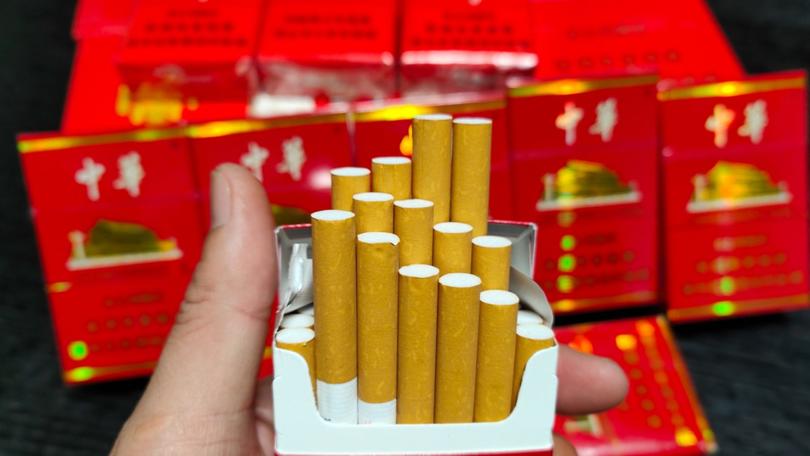China’s state-owned tobacco behemoth is booming, defying global trends and anti-smoking efforts

China is bucking global smoking trends as cigarette sales surge in the country, powered by “the biggest tobacco company most people have never heard of”.
The China National Tobacco Corporation, commonly known as China Tobacco, has a near monopoly on China’s tobacco product sales, which has seen the state-owned company grow into the largest cigarette producer in the world despite its relative obscurity abroad.
Retail cigarette sales in China have been growing for the past four years, reaching 2.44 trillion sticks in 2023, data from Euromonitor showed. The research group forecasts that sales will continue to increase annually, hitting 2.48 trillion by 2028.
Sign up to The Nightly's newsletters.
Get the first look at the digital newspaper, curated daily stories and breaking headlines delivered to your inbox.
By continuing you agree to our Terms and Privacy Policy.Euromonitor added that growth has coincided with the increasing popularity of “slim” cigarettes, often advertised as “low-tar”, and various types of flavoured cigarettes.
These trends — fuelled by China Tobacco — come against the backdrop of a long-term decline in cigarette sales globally. Between 2019 and 2023, annual worldwide sales of cigarette sticks fell by about 2.7 per cent to 5.18 trillion, according to Euromonitor data.
At more than 300 million, China has the most cigarette smokers in the world, making up nearly a third of the world’s total smokers, according to the World Health Organisation.
While Beijing has made commitments to curb smoking prevalence, it hasn’t appeared to have materially impacted tobacco sales.
The State Tobacco Monopoly Administration, which oversees China Tobacco’s operations, reported that China’s tobacco industry realised revenue of about 1.5 trillion yuan ($320 billion) in fiscal year 2023, up 4.3 per cent from the previous year. China Tobacco is estimated to make up 97 per cent of the country’s tobacco production and sales.
Philip Morris International, the world’s second-largest tobacco company, reported a net revenue of $US35.2b ($53.5b) in 2023.
‘Conflict of interest’
One of the main factors that has cut global tobacco use, especially in wealthy countries, has been the World Health Organisation Framework Convention on Tobacco Control, aimed at reducing global tobacco use, experts said.
Gan Quan, senior vice-president of the tobacco control department at Vital Strategies, said: “We tend to see less progress in countries where the industry is able to influence government policy.”
In the case of China Tobacco, industry and government policy directly overlap. The company was founded in 1982 with the express purpose of bringing the industry under one centrally planned umbrella.
According to Quan, China’s STMA is directly involved in setting tobacco control policy in the country. Thus, China Tobacco functions as both a company and a regulatory agency for the Chinese tobacco market, creating “an obvious conflict of interest.”
“China Tobacco has been exploiting this insider status and wielding its influence within the government to effectively block the adoption of tobacco control policies,” he added.
By 2014, the behemoth had over half a million employees and controlled 33 provincial tobacco watchdog bureaus, 57 cigarette enterprises, and more than 1000 other small commercial businesses.
The company is estimated to be contributing as much as 12 per cent to China’s tax revenue, according to Bath University.
The belief in China that tobacco growing is essential to farmers and that tobacco tax is an important contributor to the national economy are among the barriers to tougher government regulation, Judith Mackay, director of the Asian Consultancy on Tobacco Control said.
China Tobacco and its Hong Kong-based subsidiary China Tobacco International (HK) did not respond to an inquiry from CNBC.
Global expansion
Jennifer Fang, research fellow and project manager at the Pacific Institute on Pathogens, Pandemics and Society, said that China Tobacco’s monopoly status had pushed its strong growth at home, paired with China’s large population of smokers and a lack of competition from Western brands.
While brands such as Phillip Morris’ Marlboro are sold in China, it’s through licensing agreements with China Tobacco.
Given its domestic dominance, China Tobacco was almost entirely focused on the Chinese market for most of its history. For this reason, it has flown under the radar of tobacco control research, which has been focused on transnational tobacco companies considered as “Big Tobacco”, Fang said.
However, research she conducted on China Tobacco between 2016 and 2020 showed how the company had been expanding globally under Beijing’s One Belt, One Road initiative, faced with the potential for a more saturated market and stricter tobacco regulation at home.
As of 2019, China Tobacco had expanded its global reach to 20 countries, operating through 34 off-shore facilities, which include sales offices, manufacturing plants, and specialised tobacco procurement companies, according to Fang.
This trend appears to have continued in recent years based on Chinese exports.
China’s tobacco exports reportedly experienced robust growth in 2023 at $US9.173b, an year-on-year increase of 22.2 per cent.
An important piece of recent expansion has been its subsidiary China Tobacco International (HK), which had its IPO on the Hong Kong Stock Exchange in June 2019.
The company’s stock is up over 376 per cent since its Hong Kong debut, according calculations based off LSEG data. It is up nearly 160% so far this year.
Around the time of the IPO, an analyst in Tobacco Control wrote that “the goal of the IPO was to finance market expansion in CNTC target markets and establish strategic collaborations with other cigarette companies”.
The expansion shows that China Tobacco aspires to follow in the footsteps of international tobacco giants like Philip Morris International and British American Tobacco, said Mackay of Asian Consultancy on Tobacco Control.
“The ultimate goal is to sell more cigarettes or nicotine products – it is the goal of every tobacco company,” she said. “The effects can’t be anything other than detrimental.”
CNBC
Originally published on CNBC
